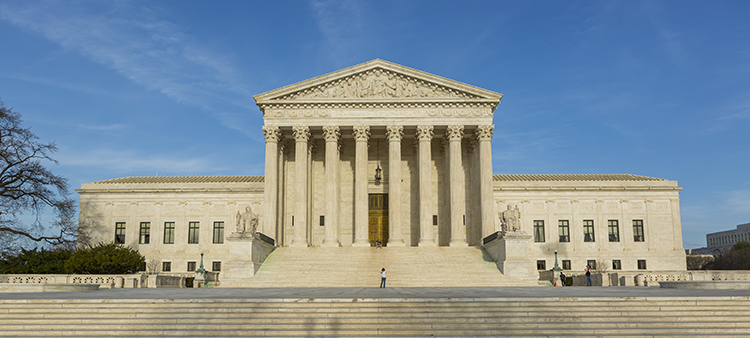U.S. Supreme Court
Emergency docket orders should ‘inform’ courts in similar cases, SCOTUS says

The U.S. Supreme Court on Wednesday allowed President Donald Trump to remove, for now, three Democratic members of the Consumer Product Safety Commission, pointing to its prior emergency docket order allowing the firing of board members of two other independent agencies. (Photo by Rob Crandall/Shutterstock)
The U.S. Supreme Court on Wednesday allowed President Donald Trump to remove, for now, three Democratic members of the Consumer Product Safety Commission, pointing to its prior emergency docket order allowing the firing of board members of two other independent agencies.
“Although our interim orders are not conclusive as to the merits, they inform how a court should exercise its equitable discretion in like cases,” the Supreme Court said in its July 23 decision granting an emergency request by the Trump administration.
The decision in the other case, Trump v. Wilcox, reflected the Supreme Court’s judgment that the risk of harm is greater when the government must allow a targeted official to continue working than when a wrongfully fired person is unable to work, the Supreme Court said.
“The same is true on the facts presented here,” the Supreme Court said.
Justice Elena Kagan dissented in an opinion joined by Justice Sonia Sotomayor and Justice Ketanji Brown Jackson.
Kagan said the emergency docket rulings have “all but overturned” Humphrey’s Executor v. United States, a 1935 Supreme Court decision that held that Congress can prevent a president from removing without cause members of the Federal Trade Commission, a multimember independent agency.
Kagan also criticized the high court for relying on Wilcox.
“So only another under-reasoned emergency order undergirds today’s,” Kagan wrote. “Next time, though, the majority will have two (if still under-reasoned) orders to cite.”
This is “turtles all the way down,” Kagan said, citing another opinion.
The case is Trump v. Boyle.
Publications covering the decision include the Washington Post, Law.com, Law360, Reuters, the Volokh Conspiracy and SCOTUSblog.
Write a letter to the editor, share a story tip or update, or report an error.

